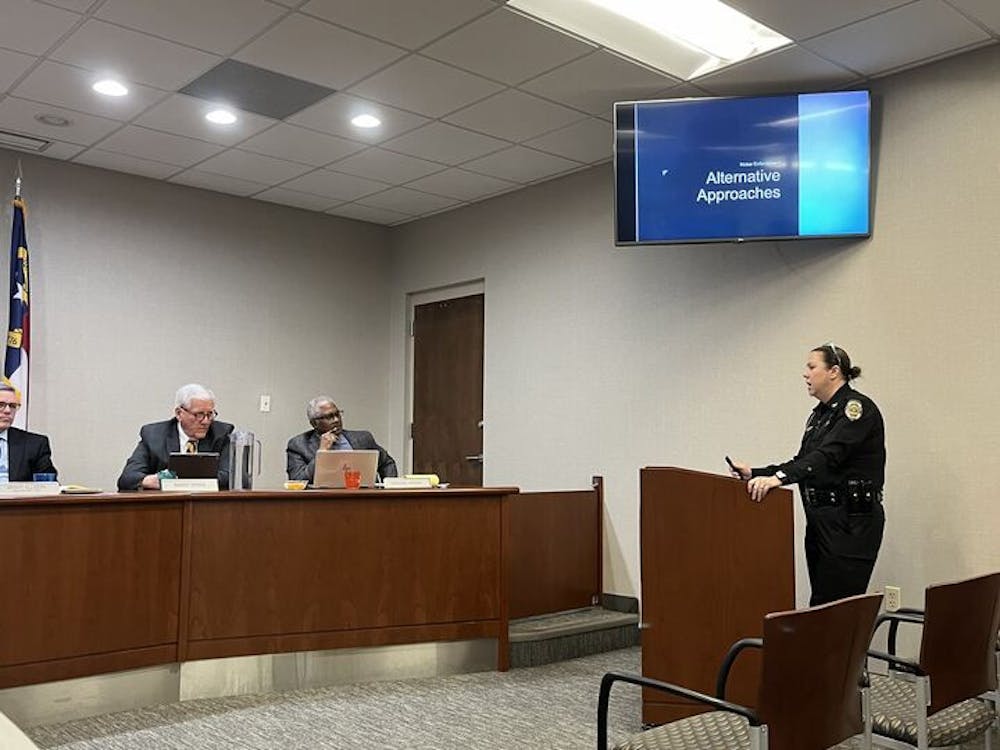Elon Town Council discussed alternatives to criminal noise ordinance citations on March 12 following Elon University students raising concerns about the harsh penalties.
Currently, issuing citations following a noise complaint is left to the discretion of the Town of Elon Police Department officer responding to the noise complaint. If a citation is issued, Elon considers this a criminal violation, not a civil one.
In response to students voicing their concerns over receiving a criminal noise citation, Elon Police Chief Kelly Blackwelder compiled research on alternatives to issuing criminal citations.
Some of these suggestions included pre-party registration, the Good Neighbor Initiative and progressive civil penalties — all of which the University of North Carolina at Chapel Hill is looking to employ. Pre-party registration would allow anyone wanting to throw a party to register it with the university, which would automatically relay that information to the police department. If a noise complaint is called in, the person throwing the party would get a text message or phone call telling them to shut it down within a determined amount of time before any police intervention occurs.
The Good Neighbor Initiative was employed by Elon prior to COVID-19 and focuses on building a community among students and non-students living in the same area. Its goal would be to provide optimal living conditions for both parties through educational efforts and creating relationships.
Instituting progressive civil penalties would decriminalize initial noise citations, while still giving the police some power. For example, the first two citations would result in civil fines, while the third would lead to a criminal citation.
Another possible solution would be decriminalizing a noise ordinance violation completely; however, Blackwelder and several council members disagreed with this approach. Blackwelder maintained that some aspect of the solution has to involve a criminal citation in order to maintain the police department's authority to be on the premises at a party.
“I’m a person that really wants to see something work,” Blackwelder said. “I think it has to say criminal. If in every day this is how we normally do it, ‘civil, civil, then criminal,’ I’m fine with it because, at the end of the day, I’m looking to find a balance. I’m looking to improve quality of life.”
Despite students voicing their concerns over the harsh penalties for noise ordinance violations, data gathered by Elon Mayor Emily Sharpe does not support the use of criminal citations in most cases.
“In 2022, 10.7% of noise complaints resulted in citations,” Sharpe said. In 2023, through the month of September, 9.1% resulted in a citation.”
According to Blackwelder, numerous noise complaints have been made since August 2023, but only 10 have resulted in criminal citations.
Nonetheless, the town council is listening to students’ concerns and tasked Blackwelder with creating a new plan to put in place for the 2024-25 academic year.
During the meeting, town council members also chose to endorse the completed 2024 pavement condition survey. The survey’s results found that while Elon’s roads are in “very good condition,” maintenance needs to be done to prevent future costs
John Johnson, an engineer for the town of Elon, recommended making repairs to different types of cracking on the roads by using pavement seal to cut costs.
“By sealing it, we lengthen the life, which means that over 50 years, instead of rebuilding each street twice, we’re rebuilding each street once,” Richard Roedner, town manager, said.
While past town council members have disapproved of pavement sealing due to its unaesthetic look, current town council members seemed receptive to its use.
The council approved Johnson and his team to move forward with creating plans for road improvements to present at a future meeting.
“It is unsightly, but so is the amount of money that you have to spend to replace a street,” Sharpe said.


